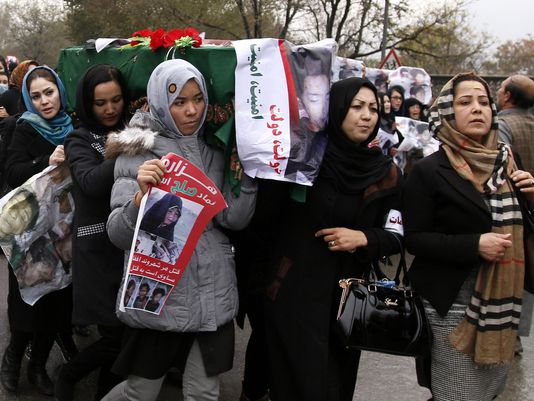By Humayoon Babur,

KABUL, Afghanistan – Thousands of people gathered outside the Presidential Palace in the center of the Afghan capital on Wednesday, holding aloft the coffins of seven ethnic Hazaras who had been kidnapped and beheaded, while calling for a new government that can ensure security in the country.
The protesters held banners and photos of the victims — who include a nine-year-old girl — as they chanted “Death to the Taliban,” ”Down with the Government” and “Death to Pakistan.”
They had walked around 10 kilometers (6 miles) through the rain, carrying the green-draped coffins of the four men, two women and child who were found with their heads nearly cut off on Saturday in the southeastern province of Zabul.
They had been kidnapped in neighboring Ghazni province up to six months earlier. Afghanistan’s spy agency dismissed Taliban claims that affiliates of the Islamic State group were behind the killings. In the past five days, rival Taliban groups have been fighting each other in the region where the bodies were found.
The bodies of the seven victims were brought 380 kilometers (240 miles) to Kabul from Zabul on Tuesday. Protesters held an overnight vigil before beginning their march early Wednesday.
President Ashraf Ghani sent a delegation to Ghazni to investigate the killings, his office said. A statement described the kidnappers as “mainly non-local terrorists.”
The United Nations Assistance Mission in Afghanistan condemned the killings and said they could constitute a war crime. Killing and kidnapping civilians are “serious violations of international humanitarian law,” UNAMA chief Nicholas Haysom said in a statement, calling for the perpetrators to be held accountable.
The protesters called on Ghani and Chief Executive Abdullah Abdullah to resign, and said they would remain in Pashtunistan Square, outside the heavily fortified palace gates, until their demands were met.
“We came to the front gate of palace to raise our voices for justice and to condemn all acts of murder in the country,” said Sakhi Rizayee 37, one of the organizers of the protest.
Civil society activist Zahra Sepehr, another protest organizer, estimated a turnout of about 10,000, which would make it the biggest demonstration in Kabul since the killing of a young woman, Farkhunda, by a mob in March. The demonstrators included members of all Afghanistan’s ethnic groups.
“We want justice and we want this government, Ghani and Abdullah, to go so that we can have a government that protects all the people of the country and brings security to the whole country,” Sepehr told The Associated Press.
This year, the Taliban has extended its reach across Afghanistan in its fight to topple the government. Officials say the Islamic State group also has a presence in Zabul, as well as in the southeastern Nangarhar province.
The Afghan government has been battling a Taliban-led insurgency since its regime was overthrown in the 2001 U.S. invasion. With the end of the international combat mission last year, Afghan forces have been fighting the Taliban alone, assisted by U.S. and NATO advisers, taking huge casualties as the insurgents have linked up in some parts of the country with other insurgent groups, such as the Islamic Movement of Uzbekistan.
Many IMU followers in Afghanistan, including those in Zabul, have declared loyalty to the Islamic State group, officials have said.
Afghan authorities blame Pakistan for providing safe haven to the Taliban, whose leaders are believed to be based in Pakistani cities including Quetta and Peshawar. Relations between the neighbors are at a nadir and a dialogue between Kabul and the Taliban, sponsored by Islamabad, has ceased indefinitely.
Habibullah, the head of a local Kabul council, said the demonstration aimed to show the unity of the Afghan people, regardless of ethnicity or sect. “I’m Afghan only,” he said. “Our voice wants justice, brotherhood, sanctity of life, peace and equality. No one can tolerate any longer the situation we have in the country.”
He added that even during Afghanistan’s 1992 to 1996 civil war, which killed up to 80,000 in Kabul alone, no one was beheaded.
Hazaras, who are predominantly Shiite, have been the targets of past atrocities and this year have been the victims in a number of large-scale kidnappings. The green cloth covering the coffins symbolized that they were Shia.